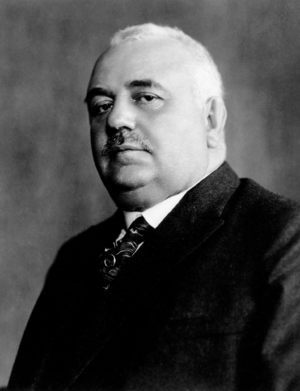Francesco Saverio Nitti facts for kids
Quick facts for kids
Francesco Saverio Nitti
|
|
|---|---|

Nitti in 1920
|
|
| Prime Minister of Italy | |
| In office 23 June 1919 – 15 June 1920 |
|
| Monarch | Victor Emmanuel III |
| Preceded by | Vittorio Emanuele Orlando |
| Succeeded by | Giovanni Giolitti |
| Personal details | |
| Born | July 19, 1868 Melfi, Kingdom of Italy |
| Died | February 20, 1953 (aged 84) Rome, Italy |
| Political party | Historical Far Left (1880s–1904) Italian Radical Party (1904–1922) Liberal Democratic Party (1922–1926) Independent (1926–1953) |
Francesco Saverio Nitti (born July 19, 1868 – died February 20, 1953) was an Italian economist and political figure. He was a member of the Italian Radical Party and served as Prime Minister of Italy from 1919 to 1920.
Nitti was known for disagreeing with the ideas of English economist Thomas Robert Malthus. Malthus believed that population growth would always outpace food supply. Nitti also studied the problems in Southern Italy that appeared after Italy became a united country.
Contents
Early Life and Education
Francesco Nitti was born in Melfi, a town in Basilicata, Italy. He studied law in the city of Naples. After finishing his studies, he started working as a journalist.
He wrote for the Gazzetta piemontese (which means "Piedmontese Gazette"). He was also one of the editors for the Corriere di Napoli ("Courier of Naples"). In 1891, he wrote a book called Il socialismo cattolico ("Catholic Socialism"). By 1898, when he was only 30 years old, Nitti became a professor. He taught finance at the University of Naples.
Political Career and Leadership
In 1904, Nitti was chosen to represent the Italian Radical Party in the Italian Parliament. He became an important voice in Italian politics.
Serving as a Minister
From 1911 to 1914, Nitti served as the minister of agriculture, industry, and trade. He worked under Prime Minister Giovanni Giolitti during this time. Later, in 1917, he became the minister of finance. He held this important position until 1919.
Becoming Prime Minister
On June 23, 1919, Francesco Nitti became the Prime Minister of Italy. He also served as the interior minister at the same time. A year later, he took on another role as the minister of the colonies.
His government faced many challenges. There was a lot of social unrest and unhappiness in Italy. People were also unhappy with the Treaty of Versailles, which ended World War I. A poet named Gabriele D'Annunzio caused trouble with his actions over the city of Fiume.
Nitti found it very hard to keep the government working smoothly. Different political groups, like communists, anarchists, and fascists, were often in conflict. After less than a year as prime minister, he resigned. Giovanni Giolitti took over as prime minister on June 16, 1920.
Social Policies and Reforms
During his time as prime minister, Nitti's government made important changes to social policy. They passed a law that created mandatory insurance for people. This insurance helped those who were unemployed, disabled, or elderly.
Later Life and Opposition to Dictatorship
Nitti remained a member of the Italian Parliament. He strongly opposed the rising power of fascism in Italy. He openly disliked Benito Mussolini, the leader of the Fascist Party.
In his 1927 book, Bolshevism, Fascism and Democracy, Nitti compared Italian fascism to communism. He wrote that there was "little difference between the two." He believed that in some ways, fascism and Bolshevism were very similar.
In 1924, Nitti decided to leave Italy. He returned after the Second World War. He was elected to the Italian Senate. First, he represented the Italian Liberal Party as part of the National Bloc. Later, he joined the Independent Left.
Nitti was a secularist, meaning he believed in separating government from religious institutions. He also opposed the Christian Democracy party. He was strongly against Italy joining NATO, a military alliance.
Francesco Nitti passed away in Rome on February 20, 1953. Throughout his entire life, he stood against any form of dictatorship. He opposed both communist and fascist rule.
Notable Works
- Population and the Social System (1894)
- Catholic Socialism (1895)
- Eroi e briganti (Heroes and brigands) (1899)
- L'Italia all'alba del secolo XX (Italy at the Dawn of the 20th Century) (1901)
- Principi di scienza delle finanzie (Principles of Financial Science) (1903)
- Peaceless Europe (1922)
- The Decadence of Europe (1922)
- The Wreck of Europe (1923)
- Bolshevism, Fascism and Democracy (1927)
Images for kids
See also
 In Spanish: Francesco Saverio Nitti para niños
In Spanish: Francesco Saverio Nitti para niños
 | Selma Burke |
 | Pauline Powell Burns |
 | Frederick J. Brown |
 | Robert Blackburn |


